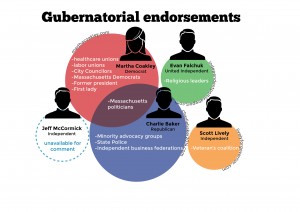
While the hype of receiving an endorsement from prominent figures may aid in funding and visibility of a campaign, several candidates running in the Massachusetts gubernatorial election said they emphasize the importance of relationships with voters.
Former U.S. President Bill Clinton joined Massachusetts Attorney Gen. and Democratic gubernatorial candidate Martha Coakley at Clark University in Worcester Thursday to endorse her political campaign.
“While Martha is thrilled to have the support of so many of the leaders in the Democratic Party, our campaign’s focus is on building a strong grassroots organization and knocking on as many doors and talking to as many voters as we can before Election Day,” said Bonnie McGilpin, a spokeswoman for Coakley’s campaign, in an email. “Voters are excited to elect our first woman governor.”
In the process of building relationships with members of the community, Coakley gained endorsements from First Lady Michelle Obama and Boston Mayor Martin Walsh at a rally in Dorchester on Oct. 3. Not only has she received endorsements from national political leaders, but also from people and organizations across the Commonwealth.
John Scammon, business manager at Sheet Metal Workers Local 63, which endorsed Coakley’s campaign on May 31, said the union values any candidate who proves loyal to the people.
“Have they been helpful to our union and the working communities? That’s how we look at it when we decide whether we want to endorse or not,” he said. “Martha is right up there. She is a person of her word. If she tells you something, it will happen. She will call you back. She will come and see you.”
John Portz, a political science professor at Northeastern University, said people are starting to identify as “unenrolled,” which means they consider himself or herself neither Republican nor Democrat.
“People see themselves as more independent-minded,” he said. “They are less impressed when a Democratic governor, Democratic president or Democratic mayor endorses somebody. That’s part of the reason endorsements in Massachusetts may not always be as powerful as they might otherwise be. Every candidate wants to get as many endorsements as they can, particularly from high-visibility people.”
On the other side of the aisle, Republican candidate Charlie Baker has also received a few big-name endorsements in the past few weeks.
Former New York Mayor Michael Bloomberg endorsed Baker on Oct. 7, and Larry Ellison, president of the Massachusetts Association of Minority Law Enforcement Officers, an association of retired officers and civilians of varying races and backgrounds from throughout the Commonwealth, endorsed Baker on Oct. 1.
“I’m honored to have Larry’s support and to add him to our growing and diverse team of community leaders across the Commonwealth,” Baker said in a press release on Oct. 1. “As Governor, I will work with civic, private sector and labor leaders like Larry every day to create great jobs, strong schools and thriving communities in every part of Massachusetts.”
By employing strong activism and demonstration of his ideas to the community, Scott Lively, an Independent candidate, said he has found no need to seek endorsements at all.
“My focus is to advance a biblical world view in the political process,” Lively said. “I have intentionally not sought endorsements. I haven’t engaged in any of the standard political activities that are typical for campaigns. I have worked to limit my campaigning to advocacy of issues and presenting ideas to voters so they can compare my ideas to other candidates.”
Evan Falchuk, United Independent candidate, gained eight endorsements from religious leaders on Oct. 2. Falchuk said it is important to focus on organizing and connecting with people across the Commonwealth who are seen and respected as leaders in their communities.
“The nature of the campaign is that we’re not out seeking to score endorsements. We are looking to build relationships,” Falchuk said. “We did a community event in Boston about a month or so ago, right before we got those endorsements from those community leaders across the state. They said, ‘I want to stand with you. I want to make sure the people in my community know that I’m standing with you.’”
Falchuk compared campaigning to a real-life version of social media.
“If a friend of yours ‘likes’ something, you’re more likely to ‘like’ that yourself or at least give it a try,” he said. “That’s the reality of human relationships, and that’s how these endorsements work.”
Jeff McCormick, another Independent candidate, was unavailable for comment on his endorsements.
Some residents said they are wary of endorsements and try to stay objective during the election process.
“Especially in the city of Boston, where there are so many students, you tend to take things with a grain of salt,” said Chris Marciano, 24, of Boston. “I try to maintain myself as an independent and try to remove myself from the situation to evaluate it. I don’t want to make a choice just based on party lines, but I think at the moment, Martha Coakley seems to be a good candidate.”
Aware of the use of endorsements in politics, other residents said they have taken notice to the influence politicians can have during an election.
“They [endorsements] are super effective,” said Stephen Campbell, 27, of Jamaica Plain. “Politicians are like super stars. They have a fan base, and sometimes they are just directing their fan base on who to vote for by endorsing someone else. It is a huge political strategy.”
Melanie Eaton, 27, of Braintree, said endorsements could be an effective strategy for candidates, but could also be detrimental to voters who only see the flair of the backing.
“Endorsements can be a good thing for partisan politics, expressing support when you share similar views on issues,” she said. “It is a problem with a lot of people in our society where they kind of latch onto personalities.”























































































































